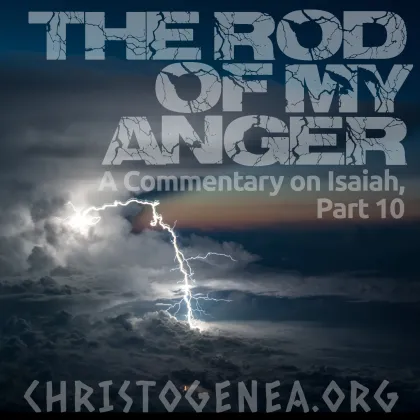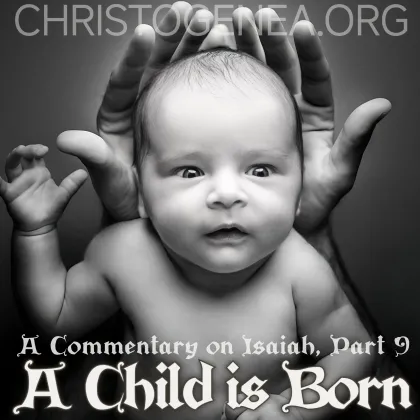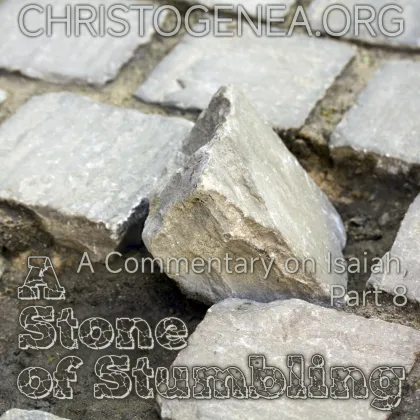Search form
October 2024
A Commentary on Isaiah, Part 11: The Promise in the Flames

A Commentary on Isaiah, Part 11: The Promise in the Flames
As we have already discussed at length, in Isaiah chapter 7 Ahaz king of Judah was given a sign, that a virgin would conceive a child, and that before the child could eat solid food, or before he could call out to his mother or father, that the kings of both Israel and Syria would be cut off. This judgment upon those kings was described in several different ways, even in chapter 9 where the birth of the child was announced. But there is something much greater being prophesied here, because in spite of the fact that the sign which had been promised to Ahaz was fulfilled, in chapter 9 we read that this child would be a ruler who would sit upon the throne of David and have no end to the increase of his government and peace, that he would forever establish his kingdom with judgment and with justice, and that his name would be called Wonderful Counsellor, the mighty God, the everlasting Father, and the Prince of Peace.
But at the very same time, the children of Israel had also been warned that their kingdoms would be destroyed, and that for their sins they would either perish or be taken into captivity. So the child described in chapter 9 is not the same child who fulfilled the promise of a sign to Ahaz made in chapter 7. In fact, the child, Mahershalalhashbaz, was a son of Isaiah himself, and he was not in line to succeed to the throne of David. Since from this point forward both the Bible and history are silent concerning Mahershalalhashbaz, he could not have been the child which the prophecy in chapter 9 had described.
Rather, the child of chapter 9 is a future Messiah, a promise of Yahweh God come in the flesh to rule His people forever, at some point in the distant future because in the meantime, Israel and Judah were destined to suffer greatly, and also to remain in a period of blindness, or darkness. For example, in Isaiah chapter 8 Yahweh had attested that He “17 …hideth his face from the house of Jacob… 22 And they shall look unto the earth; and behold trouble and darkness, dimness of anguish; and they shall be driven to darkness.” While Ahaz had a temporary comfort in Mahershalalhashbaz, the true Light would be far in the future, and Israel would suffer in the meantime. But as we shall see, there is hope and a promise in the flames of their trials.
A Commentary on Isaiah, Part 10: The Rod of My Anger

In the last presentation of our commentary on Isaiah, titled A Child is Born, we had mainly sought first to rectify the understanding of the phrase “Galilee of the Gentiles”, or correctly, circuit of the nations, in prophecy, and to illustrate the reasons for its dual meaning, since within the greater context and scope of the prophecy of Isaiah it refers to something other than its later colloquial use in reference to the aliens who had come to dwell in and around Galilee during the intertestamental period, among whom portions of the people of ancient Judah who returned from the Babylonian captivity had later settled. It is in that later historical context in which the apostle Matthew had interpreted the passage in reference to Christ, which is appropriate for His time, however the phrase itself must have had another meaning in reference to the tribes of Naphtali and Zebulun, as Isaiah had presented it here.
So in the time of Isaiah, the prophecy at the beginning of chapter 9 could not have applied to the region of Galilee in the short term. That is because in Isaiah chapter 7, it is evident that at this time Pekah is king in Israel, and the prophecies in Isaiah chapters 7 and 8 had promised his removal in a very short time. So in the near vision, which is the immediate fulfillment of those prophecies, we read in 2 Kings chapter 15: “29 In the days of Pekah king of Israel came Tiglathpileser king of Assyria, and took Ijon, and Abelbethmaachah, and Janoah, and Kedesh, and Hazor, and Gilead, and Galilee, all the land of Naphtali, and carried them captive to Assyria. 30 And Hoshea the son of Elah made a conspiracy against Pekah the son of Remaliah, and smote him, and slew him, and reigned in his stead, in the twentieth year of Jotham the son of Uzziah.” As we have already discussed, in his own inscriptions Tiglathpileser had boasted of having set Hoshea on the throne of Israel himself.
The Purpose of the Gospel
Courtesy of MightyHeidi.
Download the video at the Christogenea Media Site.
The Cup of Salvation
Courtesy of MightyHeidi.
Download the video at the Christogenea Media Site.
A Commentary on Isaiah, Part 9: A Child is Born

A Commentary on Isaiah, Part 9: A Child is Born
Thus far in these first 8 chapters of Isaiah, there have been condemnations of both Israel and Judah, and similar condemnations shall be found repeatedly throughout the first 40 chapters of the words of the prophet. But if one were to sit and read Isaiah through all at once, this seems repetitious, and it may seem that at least some of the language is repeated unnecessarily. But we must bear in mind that during the life of the prophet himself, the prophecies recorded in these chapters happened over the space of as many as fifty years. So elements of his message were repeated frequently, but it was indeed necessary to present such a testimony to the people of Judah over that long span of time.
Isaiah had begun prophesying these things during the reign of Uzziah, and through the reigns of three generations of his sons who had followed him, Jotham, Ahaz, and Hezekiah, who is last mentioned in Isaiah chapter 39. There Isaiah had informed Hezekiah that his own sons and all of his riches would be taken into captivity to Babylon. Of course, that did not happen for nearly another hundred and twenty years, and we do not know whether Isaiah had outlived Hezekiah, who would live for another fifteen years from that point. But if Jotham and Ahaz had each ruled for sixteen years, discounting the possibility of coregencies, and since the fourteenth year of Hezekiah is mentioned in Isaiah chapter 36 and made evident again in chapter 38, then the prophet had been prophesying for nearly fifty years by that time. Then some time after that, he had written the last twenty-six chapters of his book, which are addressed to Israel in captivity.
A Commentary on Isaiah, Part 8: A Stone of Stumbling

A Commentary on Isaiah, Part 8: A Stone of Stumbling
In Isaiah chapter 7 it is described that Ahaz, King of Judah, had been vexed by the kings of Israel and Aram, or Syria. With that, we had examined the historical accounts of Scripture in the books of Kings and Chronicles, wherein it is described that both kings working together in an alliance had invaded Judah, killed many tens of thousands of men in battle, and had taken many of the people into captivity. The scale of the war which they made with Judah was not fully reflected in the words of Isaiah, which were directed personally towards Ahaz himself. But in the historical books it also becomes evident that Yahweh had humbled Judah on account of the sins of Ahaz, who had led the kingdom much deeper into idolatry than it had been in the days of his fathers. But in spite of those sins, and in spite of the great harm which had come upon Judah, here in Isaiah Ahaz had been granted mercy, and Yahweh had promised him deliverance from those hostile kings, who had even sought to kill and replace him. As a sign of this forthcoming deliverance we read in verse 14 that “Therefore the Lord himself shall give you a sign; Behold, a virgin shall conceive, and bear a son, and shall call his name Immanuel.”
But this Immanuel was a sign, and the child should not be confused with the method by which Ahaz would be delivered. In the text of the passage in chapter 7, it is said that “16 … before the child shall know to refuse the evil, and choose the good, the land that thou abhorrest shall be forsaken of both her kings.” Therefore the child would only be an infant when the kings of Israel and Aram would be removed. So we should not confuse this child with the king of Assyria through whom the removal had come, or with any historical figure of the period, since the child is otherwise unknown and unidentified in Scripture – except for what we are about to see here in Isaiah chapter 8. We have also stated that this child cannot be the good king Hezekiah, the son of Ahaz, as some commentators have imagined, since Hezekiah must have been born before Ahaz his father had become king, and now Ahaz has already been king for at least a couple of years and the child is still not born. That is made evident where Hezekiah became king at age twenty-five after his father had ruled for only sixteen years, as we have already elucidated from Scripture.
The Faith of Abraham Explained
Here the substance of the faith of Abraham is laid out in a very simple manner directly from Genesis, the Gospel and the epistles of Paul, in a way in which it becomes evident that Christian Identity teachings in this area are absolutely irrefutable.
Courtesy of MightyHeidi, whose Tiktok Account is now cancelled
Download the video at the Christogenea Media Site.





 Please click here for our mailing list sign-up page.
Please click here for our mailing list sign-up page.








Recent comments